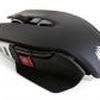Corsair today releases three new mice and mouse pads, in this review, we check out the Corsair M65 RGB ELITE game mouse. The device is sturdy with an aluminum design, it's aesthetically pleasing with configurable RGB LEDs and has a grip that much like the new pricing, is intensely impressive. We'll also show the new 'ginormous' MM350 mouse mat.
Read the full review here.

